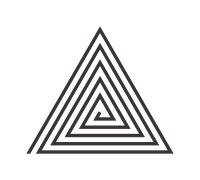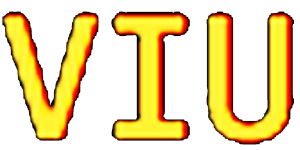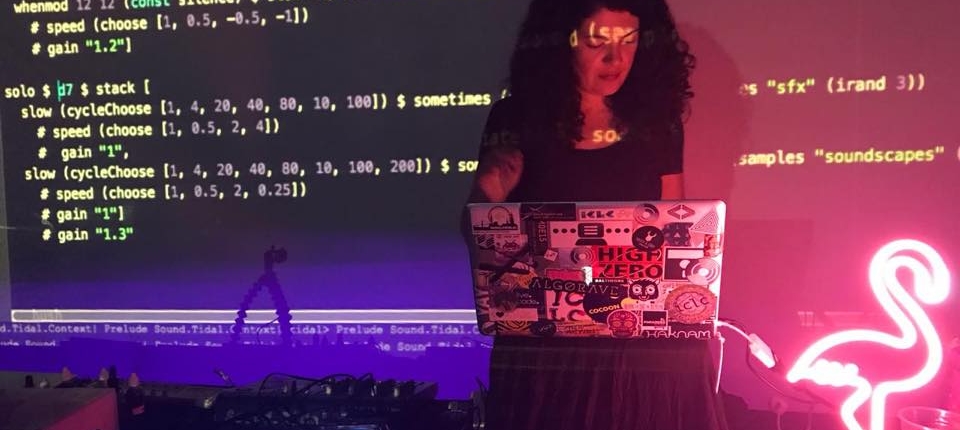is a meeting / tribute / festival / event / afterparty of Live Coding that will take place from 21 to 25 January 2019 at the Hangar facilities in the city of Barcelona. There will be workshops, presentations, demos, livecoding from scratch and Algoraves. The objective is to take advantage of the space-time coincidence of the livecoders present at the fourth international conference on live coding (January 16 to 18, 2019 in Madrid, Spain) to exchange experiences with the community of Barcelona.
Sala Ricson, Hangar: C/ Emilia Coranty 16
Program
MONDAY 21
Workshop – 16h to 20h (20€, or 50€ pack of 3)
Workshop: Development of audio-visual computational languages for artists.
By RGGTRN: Luis Navarro del Angel, Jessica Rodriguez, Emilio Ocelotl Reyes, Marianne Teixido (MEX).
INFO
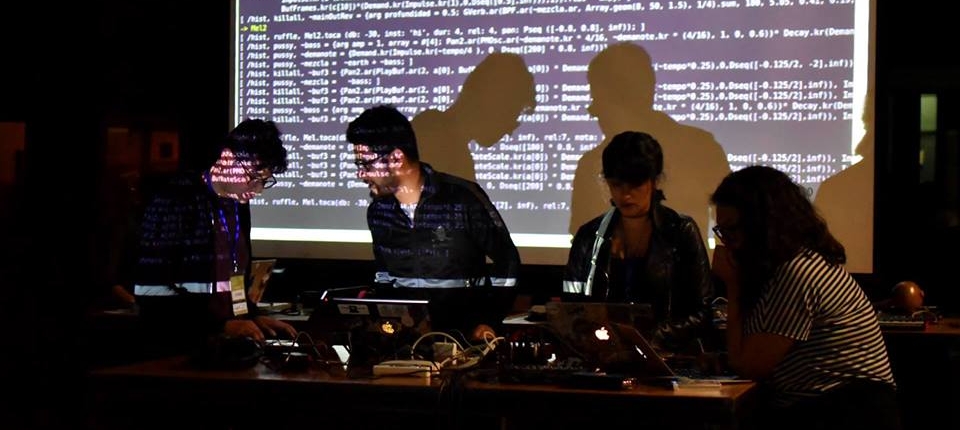
In this workshop participants are invited to imagine their own textual interfaces for live coding. This workshop focuses on facilitating the conceptual and technical creation of programming languages for audio-visual performance. Through the Haskell language and the combinatorial parsing technique, attendees can use preexisting live coding languages to generate their own languages. In addition, attendees are invited to embed literary, political and cultural concepts within their languages.
– The workshop will be taught in Spanish.
– It is necessary to bring a computer.
– If you have any questions, contact us: toplapbarcelona@hangar.org
Sign In HERE
LIVES – 20h (free)
RGGTRN: performance where the “sonidera party” aesthetics and the live coding “from scratch” collide.
Roosa Pony (UK): Roosa Pony is a collaboration between the vocalist Delia Fano Yela and the sound artist Alo Allik. This improvised performance explores the connection between different vocal styles and live coding in a context of dance music.
TUESDAY 22
This activites will be carried out in collaboraion with Phonos Foundation.
Room 55.003 Pompeu Fabra University: C / Roc Boronat 138. (free)
16:30h Implications of programming in music creation: multilayer study of source code.
Hernani Villaseñor (MEX)
http://www.hernanivillasenor.com
17:30h Mexican Livecoders’ Libraries
Instrument: Rodrigo Frenk
nanc-in-a-can: Alejandro Franco y Diego Villaseñor
18:30h Sequels of the ICLC 2019
Round table on live coding with guests of the International Conference on Live Coding. Moderated by Iván Paz and Lina Bautista.
WEDNESDAY 23
WORKSHOP 16h -19h (20€ or 50€ pack of 3)
TIDAL-CYCLES
By Alexandra Cárdenas
INFO
TidalCycles (or Tidal) is a language for making patterns with live coding. It uses text to describe the sequences, transform them and combine them through complex interactions or processes (such as reflection or rotation) of simple parts.
The workshop will be taught in Spanish.
– It is necessary to bring a computer.
– It is necessary to have the program installed, which may take some time: https://tidalcycles.org/index.php/Installation
– If you have any questions or need help with the installation contact us: toplapbarcelona@hangar.org
Sign In HERE
PRESENTACIONES – 19h (free)
Trio.
Alejandro Franco, Thomas Sánchez and Diego Villaseñor (Mex-EUA-Can).
http://www.sulponticello.com/nancarrow-sin-arrow-apuntes-para-una-ontologia-del-canon/#.W_xQzuJRfIX
https://libtim.cargocollective.com/Live-Coding
Live coding visuals with Visor. (English).
Jack Purvis (New Zealand).
Visor is a live coding environment for visuals that closes the gap between live coding and VJing by offering graphical interfaces to interact easily with Processing sketchers coded on-the-fly.
LOVELACE
Laura Llaneli. (English)
Lovelace is the surname of Ada Lovelace, the first woman programmer in the s XIX. LOVELACE is also the last name of Linda Lovelace, the deep throat porn actress. Then, LOVE-LACE could be understood as “cord of love”, and relate it to the thread in weaving, an analog system of patterns and algorithms.
FROM SCRATCH 21h (free)
The from scratch technique consists of playing live for 9 minutes starting from an empty screen. In this way, it allows to visualize the high or low level of the languages (try to play from scratch using, for example, Tidal, SuperCollider or Csound), making transparent the tools (classes, functions, data structures, etc.) that allow the livecoder to carry out the different musical tasks within the performance. These sessions seek to take advantage of the empty screen restriction and the 9 minutes to explore new possibilities.
THURSDAY 24
WORKSHOP 16h -19h (20€ or 50€ pack of 3)
HYDRA
By Olivia Jack (EU)
INFO
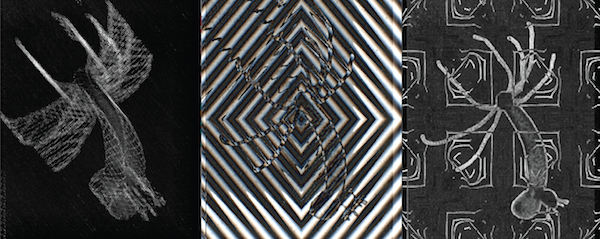
Hydra is a set of tools to make visuals with live coding. Inspired by modular synthesizers, these tools are an exploration of the use of streaming through the web to route sources and outputs in real time.
https://hydra-editor-v1.glitch.me/
– The workshop will be taught in Spanish.
– It is necessary to bring a computer.
– If you have any questions, contact us: toplapbarcelona@hangar.org
Sign In HERE
PRESENTACIONES – 19h (free)
Biofeedback as a controller in generative music and live coding. (English)
Alicia Champlin (EU)
In this demonstration a range of biofeedback components will be presented, from a simple cardiac DIY monitor with arduino to a complete OpenBCI EEG instrument, and some methods will be shown to incorporate this information into compositions and direct sound, visual, etc.
Bio-computing in artistic projects.
Jaime Lobato (MEX).
To addressing problems that can not be solved with current computational paradigms, new ways of manipulating information have been explored, such as genetic computers, fluid computers or chemical computers. These experiments have had an impact on the art world and raise some questions such as: How is aesthetics related to the tools that produce it? If the computer changes, what other kind of works could it produce?
PiranhaLab
Marianne Teixido y Emilio Ocelotl (MEX)
OpenFrameworks based viewer of the position data and light curves of observed sources. These data were collected by the Gamma Ray Observatory HAWC (High-Altitude Water Cherenkov Gamma-Ray Observatory). The project arises on the subject of the Astronomical Hackathon and is part of a collaborative project that is complemented by 2HAWC and sc_hawc and part of the Live Coding performance practice.
FROM SCRATCH 21h (free)
The from scratch technique consists of playing live for 9 minutes starting from an empty screen. In this way, it allows to visualize the high or low level of the languages (try to play from scratch using, for example, Tidal, SuperCollider or Csound), making transparent the tools (classes, functions, data structures, etc.) that allow the livecoder to carry out the different musical tasks within the performance. These sessions seek to take advantage of the empty screen restriction and the 9 minutes to explore new possibilities.
VIERNES 25
ALGORAVE 19h (free)
The Algoraves are events where music generated with algorithms is danced, including the practice of live coding, as well as other approaches to control and perform generative music.
Participants:
| Diego Dorado |
| Niklas Reppel |
| Alexandra Cárdenas |
| Rodrigo Frenk |
| Linalab – Ivan Paz |
| Scorpion Mouse |
| Jack Purvis |
| Olivia Jack |
| Turing Tarpit |
